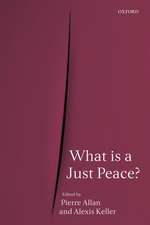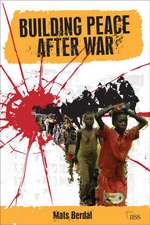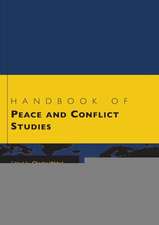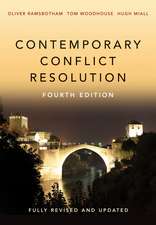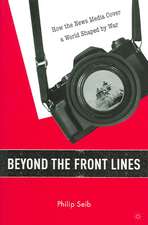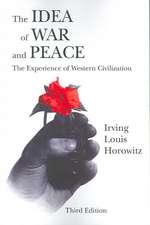Peacebuilding After Peace Accords – The Challenges of Violence, Truth and Youth: RIREC Project on Post-Accord Peacebuilding
Autor Tristan Anne Borer, John Darby, Siobhan Mcevoy–levyen Limba Engleză Paperback – 31 ian 2007
| Toate formatele și edițiile | Preț | Express |
|---|---|---|
| Paperback (1) | 193.52 lei 6-8 săpt. | |
| MR – University of Notre Dame Press – 31 ian 2007 | 193.52 lei 6-8 săpt. | |
| Hardback (1) | 441.15 lei 6-8 săpt. | |
| MR – University of Notre Dame Press – 14 ian 2022 | 441.15 lei 6-8 săpt. |
Preț: 193.52 lei
Nou
Puncte Express: 290
Preț estimativ în valută:
37.03€ • 38.59$ • 30.66£
37.03€ • 38.59$ • 30.66£
Carte tipărită la comandă
Livrare economică 03-17 aprilie
Preluare comenzi: 021 569.72.76
Specificații
ISBN-13: 9780268022044
ISBN-10: 0268022046
Pagini: 124
Dimensiuni: 151 x 228 x 10 mm
Greutate: 0.21 kg
Ediția:1
Editura: MR – University of Notre Dame Press
Seria RIREC Project on Post-Accord Peacebuilding
ISBN-10: 0268022046
Pagini: 124
Dimensiuni: 151 x 228 x 10 mm
Greutate: 0.21 kg
Ediția:1
Editura: MR – University of Notre Dame Press
Seria RIREC Project on Post-Accord Peacebuilding
Notă biografică
John Darby is professor of comparative ethnic studies at the Kroc Institute for International Peace Studies at the University of Notre Dame, where he is also research director.
Tristan Anne Borer is associate professor of government at Connecticut College.
Siobhán McEvoy-Levy is associate professor of political science at Butler University.
Descriere
During the 1990s, optimism abounded because international violence was in decline. The number of armed conflicts decreased worldwide from more than fifty in the early 1990s to fewer than thirty a decade later. This drop resulted largely from negotiations leading to peace accords. However, in a disturbingly large number of places, war was actually succeeded not by peace but by a stalemate. Peace accords were plagued by problems, including economic hardship, burgeoning crime, postwar trauma, and persistent fear and suspicion. Too often, negotiated settlements merely opened another difficult chapter in the peace process, or worse, led to new phases of conflict.
This disappointing record is the subject of a multiyear project conducted by the University of Notre Dame’s Research Initiative on the Resolution of Ethnic Conflict (RIREC). Located at the Joan B. Kroc Institute for International Peace Studies, RIREC explored three significant challenges of the postwar landscape: the effects of violence in internal conflicts after peace agreements have been signed; the contributions of truth-telling mechanisms; and the multidimensional roles played by youth as activists, soldiers, criminals, and community-builders. The project led to the 2006 publication of three edited volumes by the University of Notre Dame Press: John Darby’s Violence and Reconstruction; Tristan Anne Borer’s Telling the Truths: Truth Telling and Peace Building in Post-Conflict Societies; and Siobhán McEvoy-Levy’s Troublemakers or Peacemakers? Youth and Post-Accord Peace Building.
In Peacebuilding After Peace Accords, the three editors revisit the topics presented in their books. They examine the dilemmas each of the three challenges presents for postwar reconstruction and the difficulties in building a sustainable peace in societies recently destabilized by deadly violence. The authors argue that researchers and practitioners should pay greater attention to these challenges, especially how they relate to each other and to different post-accord problems. A foreword by Archbishop Emeritus Desmond Tutu sets the context for this volume, and an afterword by Eileen Babbitt reflects on its findings.





